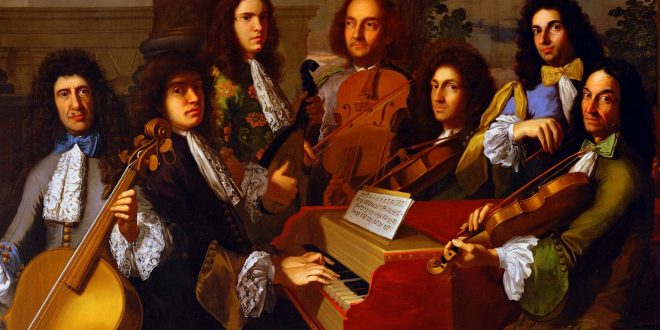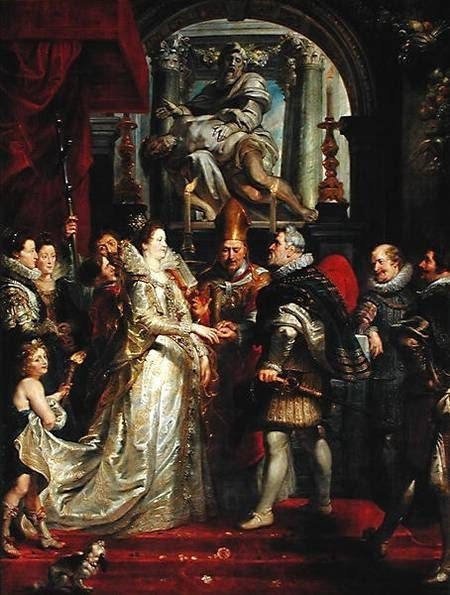Giulio Romolo Caccini, also known as Giulio Romano, was born on the 8th of October 1551 to the carpenter Michelangelo Caccini and his wife, whose name is not known. His elder brother was the Florentine sculptor Giovanni Caccini. What was important about this man?
Thanks to his outstanding musical talent, Giulio Caccini became a famed Italian composer, singer, instrumentalist, and writer of the late Renaissance and early Baroque eras. Moreover, he was one of the founders of the genre of opera, and one of the creators of the new Baroque style. During his studies in Rome, Caccini earned the great reputation of an exceptional lutenist, although he was also skilled in playing the viol and the harp, and he was also notable for his skills as a competent singer. The fame reached the city of Florence, and Francesco de’ Medici, Grand Duke of Tuscany (son of Cosimo de’ Medici and his wife, Eleanor of Toledo) invited him to Florence to work as a professional musician at the ducal court, offering him lucrative commissions.

Since 1579, Caccini became a well-paid and popular singer at the Medici court. He preferred to be a tenor, having his performances accompanied with the viol or the lute. He sang and played at a versatile range of entertainments – weddings, festivities, receptions of foreign dignitaries by Grand Duke Francesco, festivals, and elaborate state ceremonies at the ducal court. Caccini prepared for every occasion passionate and elaborate spectacles, which were well received by the Grand Duke and an audience, and which contributed to the creation of opera. In Florence, Caccini also communicated with humanists and writers, as well as scholars studying classics and ancient texts. Caccini was a distinguished member of the illustrious Florentine Camerata, also known as the Camerata de’ Bardi, for humanists, musicians, poets, and other artists gathered at home of their wealthy patron – Count Giovanni de’ Bardi – to discuss at length the arts, in particular music and drama. Together with other members of this group, Caccini considered it important to revive the glory of ancient Greek dramatic music, and they dedicated a lot of time to this mission.

Becoming more experienced, Caccini earned a considerable fame in Tuscany as a singer, a composer, and an instrumentalist. The Florentine Camerata succeeded in establishing a new genre in music: they created the concept of monody, which was an emotionally affective solo vocal line, accompanied by simple chordal harmony on one or more instruments. This musical genre was drastically different from the complex polyphonic melodies of the high and late Renaissance eras. Caccini did not always serve Grand Duke Francesco: he traveled to Rome in 1592 as the secretary to the Count de’ Bardi, his another patron, where he mingled with Roman intellectuals of all types. He was doomed to be disappointed: the conservative Roman school of music did not appreciate Caccini’s revolutionary musical performances and his impressive spectacles.

Caccini returned to Florence to the Medici court. Unfortunately, Caccini does not come across as an honorable man. For some reason, perhaps to obtain more favor with Grand Duke Francesco, Caccini informed him about the illicit love affair between Eleonora, the wife of Pietro de’ Medici, who was Francesco’s youngest brother, and Bernardino Antinori, a nobleman from one of the most prominent Florentine families. This led to a tragedy: an incensed Pietro strangled his adulterous spouse with a dog leash in July 1576 at the Villa Medici at Cafaggiolo, and later Pietro had her lover imprisoned and killed as well. Caccini could have benefited from his actions and gain promotions or higher commissions, for Grand Duke Francesco de’ Medici was not an honorable man either, especially given Francesco’s tacit participation in the murder of his sister – Isabella de’ Medici, Duchess of Bracciano – at the hands of her husband, Paolo Giordano I Orsini.
After the death of Francesco and the ascension of his brother – Ferdinando de’ Medici – to the ducal throne, Caccini served the new Grand Duke and quickly gained Ferdinando’s favor due to his talents. Caccini’s main rivals were Emilio de’ Cavalieri and Jacopo Peri, and according to some sources, Caccini’s intrigues led to the removal of Cavalieri from his post as director of festivities for the wedding of King Henry IV of France and Maria de’ Medici in 1600. In the last two decades of his life and the first decades of the 16th century, Caccini continued working as a singer, teacher, and composer. He trained many young musicians to sing and play in the new style, including Giovanni Gualberto Magli, who sang in the first production of Monteverdi’s first opera ‘Orfeo.’ As if fate had punished him for his sins, Caccini’s influence was gradually lessening, and after 1610, he was no longer as influential in Florence as he had been before. He suddenly became interested in sacred polychoral music and participated in many performances of this type.

Caccini’s main legacy is the stile recitativo, which he had invented and which became the spectacular style of monody popular not only in Florence, but in the whole of Italy, in particular in Florence and Venice – the two musical centers of Europe of the time. Caccini’s achievement was to create his own musical expression, which was as easily understood as oral speech, and which later evolved into the operatic recitative. He also influenced other stylistic and textural elements in Baroque music. Caccini’s famed collection of monodies and songs for solo voice and basso continuo, which was called Le nuove musiche, was published in 1602 with the sponsorship of Ferdinando de’ Medici, and it was received by an audience exceptionally well.
Giulio Caccini wrote music for 3 operas: ‘Euridice’ (1600) which he had created together with Jacopo Peri, known as Il Zazzerino, and performed with Peri as well, ‘Il rapimento di Cefalo’ (1600), and the second version of ‘Euridice’ (1602). He also composed the music for one intermedio (Io che dal ciel cader farei la luna) in 1589. None of his music written for multiple voices survives, even though we know that he was involved with polychoral music around 1610. Giulio Caccini passed away, most likely due to his old age, in Florence on the 10th of December 1618, and he was buried in the Basilica della Santissima Annunziata. He had a lavish funeral ceremony paid by the Medici family – by Cosimo II de’ Medici, Grand Duke of Tuscany, who was Ferdinando’s eldest son with Christina de Lorraine. Giulio Caccini’s son was the composer Francesca Caccini, also known by the nickname La Cecchina, and his daughter was the singer Settimia Caccini, who was one of the first women to build a successful career in music.
All images are in the public domain.
Text © 2020 Olivia Longueville





